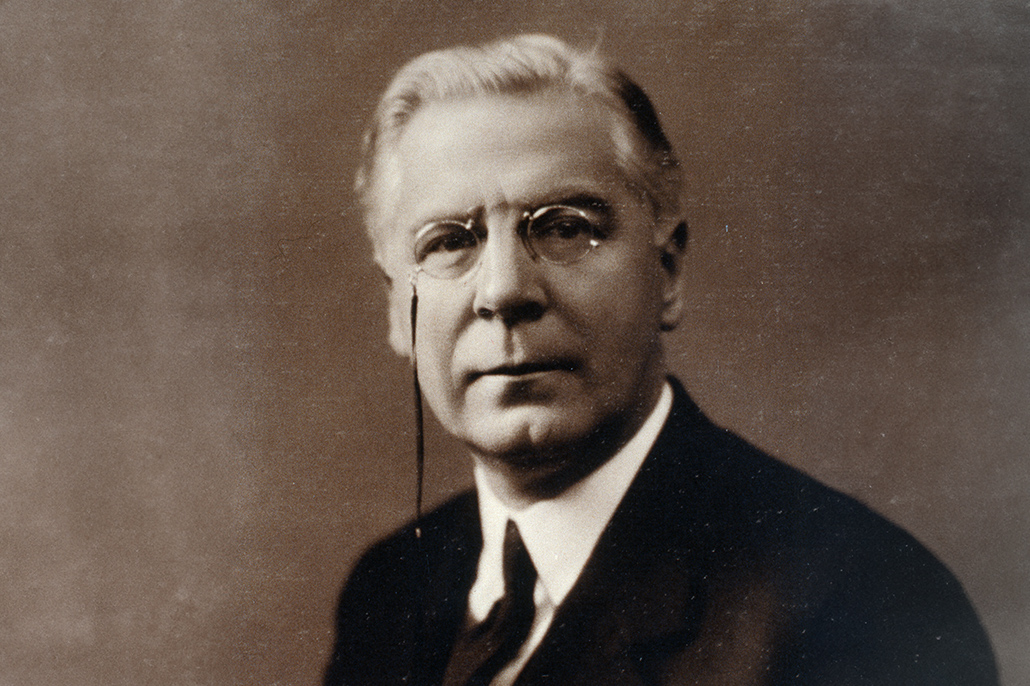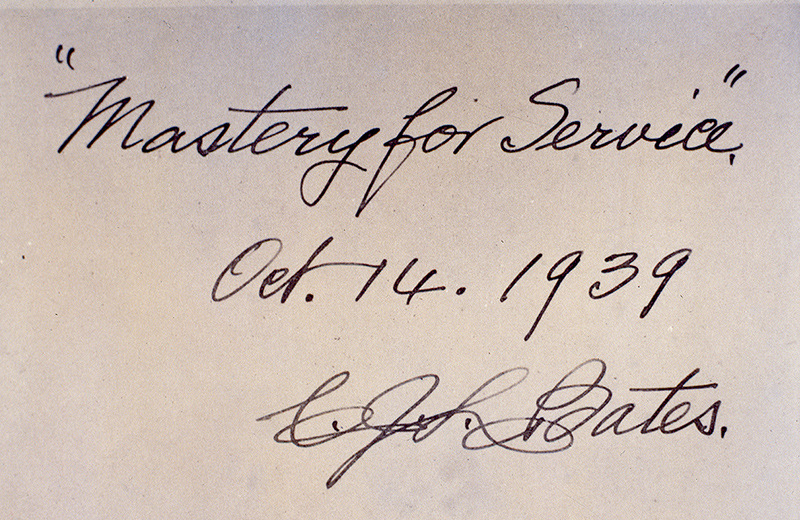私たちの校訓
「マスタリー・フォア・サービス」

この英文は、高等学部商科の学生が1915年に刊行した『商光』創刊号に、C.J.L.ベーツ高等学部長(後の第4代院長)による講演論説「OUR COLLEGE MOTTO“MASTERY FOR SERVICE”」として掲載された歴史的文書です。C.J.L.ベーツは、高等学部のモットーとして“Mastery for Service”を提唱しました。
人には二つの面があります。一つは個人的で私的な面、もう一つは公的で社会的な面です。
人それぞれに、ただ一人で生きるべき生活があり、これには誰もたちいることができません。それは一人ひとり別々の、個人としての生活です。しかし、人の生活はそれだけのものではありません。もう一つの面が人の生活にはあります。この面を私たちは他の人々と分かち合っています。人のこの両面をつねに心にとめておくことが私たちの責務であり、また与えられた恵みです。
このそれぞれの面にふさわしい人生の理想があります。一つは自己修養であり、もう一つは献身(自己犠牲)です。しかも、この理想は相反するものでなく、むしろ相補うものです。いずれも、一方だけでは完全でなく、もう一つの理想から独立したものでもありません。自己をきたえることを、ただそれだけを目的に追求するとすれば自己本位になってしまいます。一方、自己をささげることが人生の唯一の規範であるならば、“意気地なし”ができあがります。しかし、自己の修養は献身の土台なのですから、それは正当なものであるばかりか、必要なものです。自己修養のような土台があってこそ献身はほんとうに効果を発揮するのです。
ですから、校訓「マスタリー・フォア・サービス」という言葉が意味するのも、人にこの二つの面があるということなのです。私たちは“弱虫”になることを望みません。私たちは強くあること、“さまざまなことを自由に支配できる人”(マスター)になることを目指します。マスターとは、知識を身につけ、チャンスをみずからつかみ取り、自分自身を抑制できる、自分の欲、名誉や飲食や所有への思いを抑えることができる人です。
私たちは、他人や境遇、あるいはみずからの情念に“縛られた人”(奴隷)になるつもりはありません。私たちがマスターになろうとする目的は、自分個人を富ますことでなく、社会に奉仕することにあります。私たちは、広い意味で人類に奉仕する人になることを目指しているのです。英国では、公職にある者が“国民への奉仕者 civil servants(公務員)”と呼ばれ、最高位の公職者が“国家のしもべ Ministers of State(国務大臣)”と呼ばれています。これは公職者の働きの本質をうまく表わした呼び名です。公職にある人の責務とは命令することでなく、仕えることなのです。要するに、人の偉大さはどれだけ社会に奉仕をおこなったかによって決まるのです。
それゆえ、本校の理想は強くて役に立つ人になることであり、弱くて使いものにならない人になることではありません。それぞれがマスターと認められる人になることです。しかし、マスターになったとしても、威張ってみせたり、贅沢をしたりすることを望むのでなく、この世界が、自分が生きていたことによって、より良くなることを目的として、人類のために何か有益な奉仕をすることを願うのです。
私たちが理想とする事業家は賭博師でも守銭奴でもありません。マスターであるがゆえに、成功する人、事業の基本原理を理解し、なすべきことを知っている人、他の人ならば失敗しかねない場合でも勤勉と正直により成功を収める能力がある人です。たんに銀行の預金高を増やすことでなく、その財力を社会状況の改良に用いることを人生の目的とする人、公共心をもち、社会的義務に鋭い感覚をもっている人なのです。そのような事業家は従業員からも敬愛され、顧客からも尊敬されるでしょう。
私たちが理想とする学究の徒は、ただ知識を吸収するだけで、絞られるまで他に与えない、知識のいわばスポンジのようなものであってはなりません。知識を喜んで探求するとしても、ただ知識を得るためでなく、ましてみずからの名声のためでもなく、人類により良い奉仕を行うことを目指して知識を探求することが学究のあるべき姿です。
墓碑に「人として生まれ、木工(たくみ)*として死す」などと刻まれることがあります。私たちはそのような人生の結末を望みません。そのような終わり方は人生の成功とは言えません。「人として生まれ、商人として死す」あるいは「人として生まれ、大金持ちとして死す」「人として生まれ、政治家として死す」—そのいずれであっても、同じように成功だとは言えないのです。真に人である、つまり「マスター」であると同時に人類に真に「仕える人」であること、これが私たちの理想とするところです。

*「木工(たくみ)」とした言葉は“carpenter”です。ベーツは、「木工の家」に生まれたナザレ人イエスを想起しながらこの言葉を記したと思われます。その場合、「人として生まれ」たイエスこそが「生ける神、世の救い主(キリスト)」であるというキリスト教のメッセージが前提にされています。したがって、その趣旨は職業の貴賤を論じることではありません。
Our College Motto “Mastery for Service”(原文)
Human nature has two sides, one individual and private, the other public and social. There is a life which each man must live alone, into which no one else can enter. That is his personal individual life. But a man’s life is more than that. It has another side, which it shares with other men. And it is our duty and privilege to keep before our minds these two sides of our nature. There is an ideal of life corresponding to each side. One is self-culture, the other, self-sacrifice. These ideals are not contradictory, however, but complementary. Neither is complete by itself, nor independent of the other. Self-culture pursued for its own sake produces selfishness. Self-sacrifice as the only rule of life leads to weakness. But self-culture as a basis for self-sacrifice is not only justifiable, but necessary. And self-sacrifice on such a basis is truly effective.
Now these two phases of our nature are implied in our college motto “Mastery for Service”. We do not desire to be weaklings. We aim to be strong, to be masters – masters of knowledge, masters of opportunity, masters of ourselves, our desires, our ambitions, our appetites, our possessions. We will not be slaves whether to others, to circumstances, or to our own passions. But the purpose of our mastery must be not our own individual enrichment, but social service. We aim to become servants of humanity in a large sense. In England the officials are called civil servants, and the highest officials Ministers of State. That implies a true conception of the nature of the work of an official. His duty is not to command, but to serve. In fact, a man is great only to the extent to which he renders service to society.
This then is our college ideal, to become strong, effective men, not weak incompetents; men who will be recognized as masters. But having become masters we desire not to inflate, and enrich ourselves for our own sake, but to render some useful service to humanity in order that the world may be better for our having lived in it.
Our ideal business man is neither a gambler nor a miser, but a man who succeeds because he is a master, a man who understands the fundamental principles of business, who knows what to do, and who by industry and honesty is able to succeed where other men might fail − a man whose object in life is not merely to increase his credit balance in the bank, but to use his financial power to improve the condition of society; − a man who has public spirit, and a keen sense of social duty. Such a man will be revered by his employees, and respected by his customers.
Our ideal of the scholar is not a kind of intellectual sponge that always takes in, but never gives out until it is squeezed; but it is a man who loves to acquire knowledge not for its own sake, much less for the sake of his own fame, but whose desire for knowledge is a desire to equip himself to render better service to humanity.
It is said that on the monument of a certain man there were cut the words “Born a man and died a carpenter. ” We desire no such fate. For such an end is failure. Nor would it be any greater success if it were written “Born a man and died a merchant” – or “a millionaire” – or “a politician.” To be a man, a master man and at the same time a true servant of humanity is our ideal.

